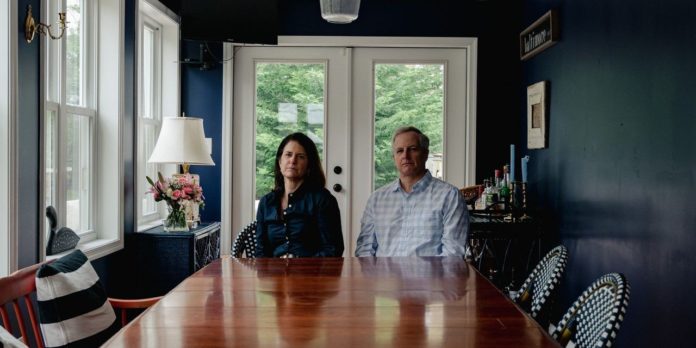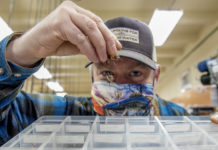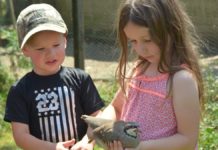Susie Chase and Stuart Sutley didn’t waste time after their youngest child left for college last fall.
Within weeks, they were hosting dinner parties with friends and colleagues and fixing up their Stevenson, Md., home. They bought fancy skis and made plans to spend more time—just the two of them—exploring the outdoors near their country house in Maine.
“I’ve got to make the most of this time,” says Ms. Chase, 53 years old. “I feel the need to do these things that are kind of on my bucket list now.”
The motto for the current generation of empty-nesters is carpe diem. Where children leaving for college once marked a relatively permanent stage of life, some empty-nesters are treating the period as a fleeting window of freedom before kids move back in, health issues arise or eldercare duties consume much of their time.
Many people have feelings of sadness and loss when children leave home, but research has found that the empty nest is often positive for parents, says Karen Fingerman, a professor of human development and family sciences at the University of Texas at Austin. After they get through the transition, a couple’s shared connection gets stronger, relationships with adult children improve and parents develop new interests, she says.
Susie Chase and Stuart Sutley playing pickleball in their driveway.
“People adjust and find a lot of new richness in all their relationships,” says Dr. Fingerman.
One driving factor behind the empty-nest urgency is the rise in adult children boomeranging back to the family home—or never moving out in the first place. In 2021, 34% of 18- to 34-year-olds were living with their parents, compared with 29% in 2007, according to an analysis of federal data by the National Center for Family and Marriage Research at Bowling Green State University.
Maggie Carpenter, 52, and Matt Lewis, 55, became empty-nesters when their daughter left for college in the fall of 2020. The couple took advantage of their new kid-free time to go kayaking, throw parties, watch movies and cook together.
“Having to juggle kids and work for so many years, to have the freedom to just focus on what I want to do has been really amazing,” says Dr. Carpenter, a family physician in New Paltz, N.Y.
Dr. Carpenter and Dr. Lewis, a radiologist, are now talking about joining a singing group and making tentative plans to work remotely from abroad.
The couple are making the most of their empty-nest freedom because they know how tenuous it can be. Just before the end of her first semester, their daughter took a leave from school and came home for a month. And the couple’s son, who is slated to graduate from college in December, is planning to live at home after graduation for six months to save money.
Dr. Carpenter says she and her husband love spending time with their kids but she is already lamenting the impending loss of her clean house and the lighter load of laundry.
“I think it will be OK because it is time limited,” she says of her son’s plans.
For Ms. Chase, the feeling of urgency to maximize her empty-nest freedom comes from potential health concerns. Her parents are relatively healthy, but they are 90 and 86.
“I see myself as a very involved caretaker for them,” says Ms. Chase, who works as the vice president for advancement, alumni and constituent engagement at Washington College in Chestertown, Md.
And she is keenly aware that she can’t take her own and the 57-year-old Mr. Sutley’s good health for granted either. “I realize we’re not going to have it forever,” she says.
About 16.8% of American adults are caring for someone age 50 or older, according to a 2020 report from the National Alliance for Caregiving and AARP. That is up from 14.3% in 2015. Caregivers of older adults are about 50 years old, on average, and are typically taking care of a parent.
Caregiving is also lasting longer. About 28% of caregivers have been providing care for five years or more, according to the 2020 report, up from 24% in 2015.
Gen Xers generally had children later in life than baby boomers, meaning they may have fewer years to enjoy the freedom of the empty nest before their own health falters. The mean age of mothers giving birth was 27.2 in 2000, compared with 24.6 in 1970, according to data from the federal National Center for Health Statistics.
Psychologists have advice on making the most of the empty nest while it lasts.
SHARE YOUR THOUGHTS
How are you approaching an empty nest?
Reflect on your priorities and goals for that time before your kids actually leave, suggests Roni Cohen-Sandler, a clinical psychologist in South Norwalk, Conn. Start planning and preparing for activities by, for example, going on short hikes in anticipation of a bigger trip.
“It’s so much easier to look forward to something that you can experience together as opposed to thinking about the things you are losing,” Dr. Cohen-Sandler says.
Look back to the activities you used to enjoy but didn’t have time to pursue during your intensive parenting years, advises Jerrold Lee Shapiro, a professor of counseling psychology and author at Santa Clara University. Discuss and negotiate with your partner so you’re on the same page about how you’ll spend the time, says Helen L. Coons, associate professor and clinical health psychologist in the department of psychiatry at the University of Colorado Anschutz Medical Campus.
Valerie Frederickson, 58, has a list on her iPhone of the things she’s planning to do when she becomes an empty-nester: Learn Italian, take up ceramics, go fly fishing and join a book club, among other things.
Her twins are 12 years old.
“I haven’t been able to do anything that is not work- or kid-centered in really almost 13 years,” says Ms. Frederickson, founder and chief executive of human-resources executive search firm Frederickson Partners in Menlo Park, Calif. “I’m ready to have a full and fun life.”
Write to Andrea Petersen at andrea.petersen@wsj.com
Copyright ©2022 Dow Jones & Company, Inc. All Rights Reserved. 87990cbe856818d5eddac44c7b1cdeb8
Credit: Source link






























